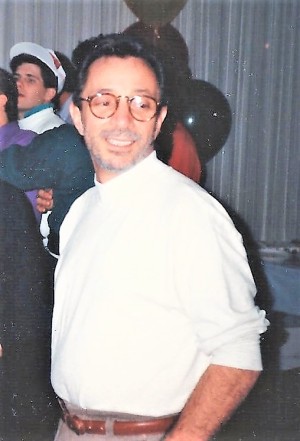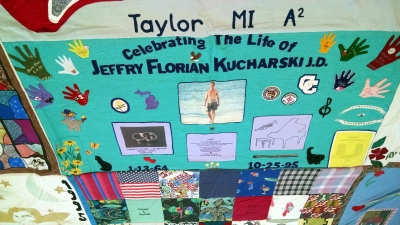“These are not numbers, but people I loved and cared about,” Michigan State alum Jon Nalley wrote in a 1991 affidavit, explaining that his ACT UP civil disobedience grew from the loss of twelve college friends to AIDS. Michigan LGBTQ Remember featured these twelve individuals for World AIDS Day last year.
For 2018, the site and this blog commemorate twelve other Michiganders lost to HIV/AIDS, all from Metro Detroit, who are specially remembered by Barbara Murray: Anthony Caputo, Chester Cislo, James Drain, Jeff Kucharsk, Tom Bartley, Jim Proffitt, Doug Pizzala, Tim Warner, Jim Beates, Scott McCready, Robin Ware, and Dan Stoepker.
Barb Murray has a unique perspective on AIDS. From 1989 to 2013, she served as executive director of AIDS Partnership Michigan, formerly Wellness Networks. Her long career is exemplary of the often-unsung role that lesbians played in caring for gay and bisexual men in the 1980s and ‘90s.
Just like Allison Bechdel, she is the daughter of a funeral director, so she was matter-of-fact in recounting the losses she witnessed on the forefront of fighting the epidemic. If she sometimes sounded detached from grief, it’s because she rarely had time to grieve. There was too much work to be done.
In mid-November, Barb and I met for lunch at Founder’s in Detroit, where she was eager to try a particular craft beer. Over the course of several hours, she reflected on a dozen people whose deaths left an indelible imprint. The conversation was something of a spontaneous offering of memories and moments, poignant touchstones that she experienced with each person.
Each of the twelve was out about their diagnosis, and Barb was not involved in client services, so her reflections betrayed no professional confidentiality.
“It was hard not to fall in love with Tony,” Barb said of Anthony Caputo. Barb and Tony became friends through his work with Wellness House. She remembered him as a “classic Italian” who enjoyed life and would rattle off stories about his high-end clientele when he was a hairdresser in New York. He was fond of telling about doing Barbra Streisand’s hair. “The best haircuts I ever got were from Tony Caputo,” Barb boasted. Her voice cracked a bit when she tried to fathom, even twenty-three years later, that he was gone, “stricken by a blood-borne disease that nobody expected.”

Barb remembered Chester Cislo as a neighborhood fixture in Ferndale, where Wellness had its office on Livernois. She could picture him walking fast, his head forward ahead of his feet as he sped past their building. “What a special guy.”
Chester attended support groups and social functions held at Wellness. “We had a lot of parties so people could get together and have fun,” Barb said. Although the agency adopted strict policies about privacy, she explained that the lines between clients and staff and board members blurred in the wake of the emergency they were grappling with. “It was a human response to a problem that had to be met.”
Her main memory of James Drain was of a quiet, sweet man with a sweet, cockeyed smile. While serving on the board for Affirmations Community Center in the early 1990s, Barb regularly saw him greeting visitors to the Pioneer Building, their former location Nine Mile Road. She didn’t know he was dealing with AIDS until Jan Stevenson, then executive director of the center, told her that James had died. For Barb, James was a key part of Affirmations whose death left a major void. “All of a sudden he was gone.”
Barb knew Jeffry Kucharski mainly through Jeff’s partner, Tom Wilczak, one of her closest gay male friends. When Jeff died at age 31, his memorial service was held at Drayton Avenue Presbyterian Church. Wilczak asked Barb and Linda Peterson to be at the door to hand out red ribbons to people coming in. “Jeff was very young, and it wasn’t fair,” she said. “Nothing about it was ever fair.”

Tom Bartley’s illness was “pretty far along” when Barb met him, shortly after she was hired as executive director of Wellness Networks. She saw it in his dark, hollow eyes and in his noticeable drop in weight. One of their earliest conversations involved a bathroom that had supposedly been rehabbed to be barrier-free. “That bathroom is not barrier free,” Tom told her.
When Barb checked, she found the facility up to code but lacking a hand bar beside the toilet or behind the tank. She knew from caring for her own parents how crucial such seemingly minor modifications could be. “I realized that just the simple act of getting up and down off a toilet was an enormous challenge for him,” she said.
Newly attuned to the physical realities endured by Tom and others with AIDS, the next day Barb went to a local store and bought a toilet seat riser with hand-bars on the sides and installed it herself.
The first AIDS funeral Barb Murray attended was for Tom Bartley.
Tom’s life partner Jim Proffitt volunteered on the reception desk at Wellness. Often the front desk became a hangout for the small staff, so Barb got to know him well. “What a sweetheart,” she said. Since Jim was such a familiar face in the community, his presence helped convey the agency as a reputable and safe place. “If Jim was there, you knew it was okay,” Barb explained. “Sort of like the Jim Proffitt seal of approval.”
She also credited Jim and Tom with showing her a caliber of gay love she hadn’t witnessed before. “They taught me how to be a couple in the face of horrible adversity,” said Barb.
“Every one of these people taught me something.”
Barb knew Doug Pizzala for a long time before he came to work for AIDS Partnership Michigan as business manager. “Bright guy. Very soft spoken. And loved his Broadway musicals,” Barb chuckled. Not only was he good at his job, but in the midst of a hard day Barb could duck into his office, close the door, and escape with Doug by listening to Phantom of the Opera.
Barb ached at the memory of having to lay Doug off when finances tightened. “I loved that guy,” she said. “So, I’ll always play that game in my head: Would he have lived longer if I’d kept him on?”
Tim Warner was another person who sat at the front desk atop the stairs at the Wellness office in Ferndale. “A very sweet young man that was caught in the jaws of AIDS.” Barb conjured an image of Tim and his partner David Wyka at an AIDS fundraiser at the Detroit Polo Club in Milford. I was puzzled that Tim and David would be so enthralled by the event until Barb reminded me that they were there to see the young horse riders, saying “You know how much gay men like to dress up.”

In speaking of Jim Beates, Barb said, “If anybody ever needs proof that the closet is a shitty place, look no further than the early days of AIDS.” Active in Friends Alliance, he was the first openly gay pastor in the Presbytery of Detroit. “We should all have ministers as good as Jim Beates,” she added.
Barb remembered Scott McCready as the “heart and soul” of Friends Alliance. She recalled that when Scott died, one of his friends followed through with a promise to take his ashes to San Francisco and sprinkle them in Golden Gate Park. “It’s one of the side stories nobody ever hears,” said Barb.
Barb called Robin Ware an “incredibly good employee.” Robin was a staff social worker with HIV. Her young daughter also carried the virus and often hung out in their office.
Barb told how in 2000 she and Robin attended the U.S. Conference on AIDS, at which they shared a hotel room because they both smoked. It was unusual for an employee to “room with the boss,” but Robin was not bothered. “And we had the best goddam time,” said Barb. “We hung out and got to know each other in a different way.” According to Barb, the two “forged a strong friendship over and above her child spending time in our office when not in school.”

When Barb got to know Dan Stoepker, his partner Brad Kosko had already died. The two had shared a three-story home in Detroit’s University Park district, where AIDS Partnership Michigan once held a strategic planning retreat. Barb remembered admiring the little library in the foyer. Dan told her how he would open books and find love notes that Brad had hidden for him to discover. “They were a source of great joy,” Barb said.
In 2005, Barb visited Dan just days before he died. “I went to see him on Tuesday,” she said. “My memory is Dan died on Thursday.”
Our lunch and her reminiscing done, we hugged and exchanged our good-byes.
“Now that I’m 72, the tears come pretty easy some days,” Barb said. “I didn’t do this much at all while I was working. It’s now that I’m retired that the memories come flooding.”
Thank you for sharing this.
LikeLike
An angel on earth
LikeLike
Tony Caputo also gave me the best haircuts I ever had.
LikeLike